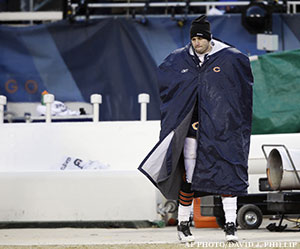Jay Cutler was trying to lead his team to the Super Bowl when he got hurt. It’s a rough game. This happens.
But how could he leave the game? How could he not give everything he had in order to get to the one game upon which all football dreams are built?
I played in one NFC Championship game. You might remember it. In January of 1993, my 49ers played the Dallas Cowboys for a berth in Super Bowl XXVII. What I remember most about that experience is what our coach, George Seifert, said early in the week. He said, “For you guys who have never been in this position before, savor it because you don’t know how many chances you’ll have like this one.”
I don’t know Jay Cutler. But I trust that he understands this as much as I do.
It had to be pretty bad for him to exit the biggest stage of his life, so I was willing to give him the benefit of the doubt. But in doing so, I found myself to be in a very distinct minority.

Seems the Jaguars’ Maurice Jones Drew, the Cardinals’ Darnell Dockett, Deion Sanders, and some other past and present players were quick to question both Cutler’s injury and his toughness. Jones-Drew even referenced former Florida coach Urban Meyer and his retirement amid health concerns: “Hey I think the Urban Meyer rule is in effect right now,” said Jones-Drew. “When the going gets tough……..QUIT.”
Now it turns out that Cutler has a torn MCL.
This is the trend in sports -- former players making a concerted effort to “relate” to the masses. I get it. It’s always smart to make any product customer-friendly. But in this case, Jones-Drew, Sanders, and the others are scribbling a churlish portrait of an elaborate landscape. And it offends me deeply. I’m not sure if I’m more annoyed by these stupid comments, or that these stupid comments came via Twitter accounts.
This ain’t middle school. And it ain’t middle school football. You do not get points for trying to prove how tough you are.
For those who play on Sunday, the goal is to win the game. And if you aren’t at your absolute best, you can’t help your team win. Cutler’s explanation was that he couldn’t plant on the leg and deliver the ball. This affects his throwing motion, which affects his velocity, which affects his accuracy as a passer, which affects his team’s chances of winning. It’s a simple formula with which all players are intimately familiar. Had Cutler stayed in the game, you wouldn’t hear anyone in the Bears locker room saying something like: “Yeah, Cutler threw 10 interceptions, but boy, I’m sure glad he proved how tough he is!”
When Cutler heard of the criticism levied by his fellow players, he is said to have been close to tears. This is understandable. It’s expected that fans and media types will question things they do not know, but when catty, half-baked theories are proffered by one’s peers, an injustice has occurred -- to everyone.
All of these Twitter-happy morons, in their effort to appease the so-called common fan, have actually done the fan a great disservice. This seems to be a popular theme these days. I mean the good folks at NewSouth Books are, as we speak, rewriting Huck Finn, eliminating the “n” word in order to spare the supposedly delicate sensibility of today’s reader.
Does complex truth ever fit into a simple package? In any genre?
Look, I’m all for making things accessible to as many folks as possible, but not if it means the audience gets screwed. It’s either the real story or it’s nothing at all.
Whether in the case of an enigmatic quarterback or a literary titan, context must be considered. We have to understand a man’s intent. Only after this has been determined can we offer sound judgment on something.
Until then, we best remain silent.
-- Alan Grant played cornerback for the Colts, 49ers, Bengals and Redskins. He is the author of "Return to Glory: Inside Tyrone Willingham's Amazing First Season at Notre Dame."




